Marcian the Stylite
Marcian was a thief but considered himself a moral one. He only stole from the dead and rarely put them in that condition before taking from them.
He resented the imputation that he was a grave robber, since that required partners and expensive equipment. Besides, he would not have been able to compete with the cutthroat families and guilds that dominated that trade in the rough-and-tumble highlands of southeastern Anatolia where he had been born sometime in the early sixth century of the Christian era.
He suspected that he was about twenty-two years of age. But his parents had died when he was a boy, so he was not sure.
Justinian the Great had only recently ascended the throne of the Byzantine Empire, which did not matter to Marcian who did not care about politics. But a Syrian innkeeper had warned him that he should be mindful of such things. After all, Marcian was a Greek-speaking Christian.
“That makes you Rumi (a Roman). As such, you might be called upon to serve your sovereign; and, if you refuse, they’ll geld you and make you into the plaything of a depraved logothete.”
“What connection do I have with the Emperor or Constantinople?” Marcian asked. “I’ve never seen either.”
To him Constantinople was the place where wealthy and richly-caparisoned knights came from in order to die in bloody skirmishes round these parts. And that was where Marcian stepped in. . .
Being both wiry of frame and nimble of feet, he was adept at plunging into an affray while the affair was still in doubt and the dust had not yet settled. It was a dangerous game, stripping fallen soldiers of their possessions as their cohorts stood about too confused or fatigued to deal with the man in the black burnous rushing through the carnage.
If Marcian stumbled upon a soldier who was still alive, he left him alone, unless the man was mortally wounded and begged to be put out of his misery, preferring a swift death to a long drawn-out one; or the ignominy of a shameful captivity. When this occurred, Marcian believed it his Christian duty to oblige and felt no compunction pilfering from the body once the wretch’s throat had been slit.
But if Marcian could not understand what the man was saying, he ignored him and moved on. For he feared that, were he to mistake a plea for succor for a request to be killed, and were he to do the man in, he would be a murderer in the eyes of God and would tilt the scale against him in the hereafter.
Marcian had a feathered companion who followed him wherever he went, a male vulture that he had raised from the time it was a chick. He had named him Aegypios for the not illogical reason that this was the Greek word for vulture. The simple folk who inhabited the tablelands between Syria and the Cilician Gates believed it dangerous to address beasts by names other than the ones Adam had given them at the time of creation.
After all, even soulless things, like mirrors, harps, or amulets, if called by nonsensical names long enough (such as “Na-Lu-Ki,” “Astarte’s Might,” or “Tongue of Orpheus”), had a tendency to attract spirits that had no name of their own and were eager to adopt one—spirits that lodged in such objects and bewitched their possessors. And if this could happen to inanimate things, how much more likely it might happen to animate ones?
Thus, shepherds called their dogs, “this one,” “that one,” and “the yellow one over there.” And for this reason, Marcian’s vulture answered to its Adamic name of Aegypios.
One gray afternoon, Marcian strolled lazily down a mountain path leading to a vast rocky basin where he had learned that a battle was to take place between a host of Byzantine irregulars and an army belonging to the Persian King. Aegypios soared between the mist-capped peaks overhead. The damp air was nipping at Marcian’s ears, so he drew the hood of his burnous down low.
It seems foolish to have a battle in a basin, he mused. They’ll be hedged in on all sides and have a hard time retreating if they have to. He munched a crust of bread and mulled over the strategy he would employ. He would have to keep away from the engagement until it well underway since the contending forces would have scouts positioned among the mountain ledges.
There was a cave nearby where Marcian had stored up several days’ worth of rations: nuts, dried fruit, and salted pork. There was a freshwater spring inside of it. He planned to roll a boulder over the entrance and hunker down until he heard the clash of steel against steel echoing through the mountain pass. Aegypios would remain outside and keep well away so as not to draw attention to his master’s hideout.
Suddenly, the vulture made a croaking sound. The thief dropped his meal and sprang behind a rocky projection. He peeped around the corner. A large army on horseback was coming up the same path Marcian had been descending, bearing the standard of the King of Sasan. Either the battle’s been called off or something has happened—perhaps a truce.
Marcian turned and ran as fast as he could back the way he had come. He had no doubt that if he were spotted, they would think him a spy. Thankfully, the horses were taking their time on the treacherous switchbacks.
He emerged from the rocks onto the plateau. It was dominated by the ruins of an ancient temple. The rubble around him was insufficient as concealment.
He thought of trying to sprint to the trees on the far side. But he doubted that he could make it before the advance guard entered the area; and, with their horses, they would be able to overtake him. To complicate matters a fat Anatolian boar was rooting in the soil, which meant others would be close by. If he tried to run, the pack would sense his fear and chase him.
A ram’s horn sounded and Marcian’s suspicions were confirmed when three other boars ran squealing to join the fourth. The horn meant that the army was emerging from the narrows and would soon achieve the rise.
In a panic, Marcian dashed to a line of four lofty pillars whose capitals were carved like acanthus leaves. They were grouped in two pairs, each supporting a crumbling entablature that had served as the portico of some pompous edifice. The fluted drums of the pillars wobbled in the wind but had been engineered to do so, being capable of withstanding the tremors of a mild earthquake.
Each pillar was too wide for a man to scale. Marcian glimpsed what he thought was a vine hanging down from the architrave of the pillar closest to him. It turned out to be a frayed length of rope. Beneath it were the shattered remains of a wooden bucket. The rope was out of reach. But Marcian jumped up and caught it. The flax fibers strained against his weight but did not snap.
Hand over hand he climbed, using his legs and booted feet for leverage. He struggled to surmount the capital and gasped in relief when his fingers made contact with the cornice. He heard the sound of cracking wood; and the rope went slack, tumbling down and landing in a coil on the bucket below.
With all his might Marcian heaved himself up and lunged over the sharp masonry, collapsing prone on the other side. A hole in the entablature discovered where the beam holding the rope had cracked. Marcian’s arms, shoulders, and ribs were on fire. But he forced himself into a crouching position so he could surreptitiously look over the flaring edge of the cornice and survey the scene below.
Aegypios had attempted to draw the soldiers away from the column by darting amid the banners. But an arrow had nearly clipped his wings, so the vulture took off, flying over the pack of boars racing toward the trees.
Marcian ducked down and lay flat on his stomach. But the elements were against him. A gust of wind caused the cape of his burnous to flutter up. He jerked it down, but it had been seen. Someone muttered in Persian and, amid the horses’ nickering, a half dozen arrows were nocked.
But only one was fired. It struck the frieze and iron tip clicked against the marble. That had been intentional. They were toying with him. There was laughter, but this was followed by a stern voice issuing a command. The same voice called out to Marcian; and, even though he could not understand Persian, there was no denying the fact that he was being hailed.
If I don’t show myself, they’ll find a way to topple this pillar. But if I stand and an arrow hits my stomach, legs, or balls, I’ll drop in pain behind the cornice and writhe and squirm in agony for hours before I die. But if I show them my heart and head, then, if the dart hits either (and the Persians are excellent archers), I should die right away.
Marcian raised his head and chest over the cornice edge. He pulled down his hood as low as it would go and turned aside, so that he would not see the fatal arrow fly. His hand held the fringe of the hood in such a way that (from below) he looked almost like a woman veiled.
The effect on the Persians was dramatic. They whispered among themselves in awe. But another voice broke in, speaking haltingly in Greek: “You. Priest. . . The Spahbed (general) demands to know who that is on the column.”
An elderly man replied in Greek but in an accent that Marcian recognized to be Syrian.
“I am not a mere priest,” he said. “I am the Metropolitan of Edessa. And I demand that you speak to me with respect.”
This was translated to the Spahbed, who released a torrent of harsh words that sounded scathing and abusive. When the interpreter spoke again, his voice was strained but deferential.
“The Spahbed apologizes for my rudeness. He asks if you would like my hand to be cut off, since, if my tongue were removed, I would not be able to translate.”
“No, I don’t want you maimed!” the Metropolitan said, flustered. He quickly changed the subject back to the Spahbed’s original question. “Tell your lord that I do not know who is on the pillar. But I have my suspicions. If he will permit me to speak, I shall relate to him all that I know.”
The relieved interpreter conveyed this message to his superior. Permission being granted, the Metropolitan spoke, pausing between breaths so that the narrative could be translated into Persian.
“We stand on the outskirts of Harran, where Blessed Abraham and his family sojourned for five years before continuing to Ur of the Chaldees. The Harranians are wizards and stargazers. They claim to be Christians, but their faith is more akin to yours. About us lie the ruins of a temple-observatory devoted to their lunar god Sin, whose bearded visage and horned crown adorn the front of yonder altar (over which spread the naked branches of a withered Judas tree).”
Marcian had often wondered whose face that was on the altar. He found it unnerving. One moonlit night, he could have sworn he had seen pupils appear in the eyes that had followed him as he traversed the plateau on his way to the mountain pass.
“When I was a lad,” the Metropolitan said, “an ascetic from Edessa named Marcian (or Morkos) challenged the god Sin to a spiritual dual by scaling that very pillar and setting up his residence there. He became known as ‘Marcian the Stylite’ (the pillar dweller).”
At this, the young thief gasped and pricked up his ears.
“Pilgrims came from the farthest reaches of the Empire to seek him out. The Edessenes set up markets at the base of the pillar and provided Marcian with food and drink. There were so many wonders attributed to him that the Emperor Leo I ordered a plank bridge built between both of those sets of pillars, so that the holy man could take his exercise by walking between them.”
Slowly, Marcian turned his gaze to the other cornice. His blood ran cold. Lying at his level was a skeleton wrapped in a robe with the skull facing him and the bony hands resting on its cheeks, as if it had propped itself up to contemplate the thief.
“Marcian the Sylite died full of years,” the Metropolitan concluded. “His body was removed from the pillars and he was laid to rest among his brethren in the crypt of the Basilica of Haghia Sophia in Edessa.”
“Then who is that?” Marcian said in a raspy voice that everyone below heard and presumed to be a supernatural hiss.
The Metropolitan crossed himself. “Tell the Spahbed that I believe that figure to be none other than the ghost of Marcian the Stylite.”
The young thief considered saying, “Indeed, it is I, Marcian the Stylite.” But he was afraid that the priest would answer in Syriac; and the only Syriac phrases Marcian knew were shlama ‘allawkhon (peace be upon you) and L-baytokh aloho ‘eleth (into your house, O God, I come), which he had tried using once to sneak into a warm church on a winter’s night only to be ejected by the ecclesiarch at the door when his accent found him out, like an Ephremite saying shibboleth. He decided that his best hope was to remain silent.
After the interpreter had translated what the priest had said, the Spahbed issued a command and the horses began to move.
“What did he say?” the Metropolitan asked.
Yes, Marcian thought. What did he say?
“My Lord, the Spahbed, does not believe that the figure is a Nazarene ghost. He believes it is Harranian god, Sin, and has ordered us to leave this unclean daeva alone so that we do not draw down its wrath.”
Quietly, the army moved on across the plateau in the direction of the paved road leading to Edessa. When the last of the horses had disappeared through the trees, Marcian looked down at the rocky earth.
I’m still alive, but I’m in a real predicament now. Even if I remove my boots and try shinnying down the pillar, I’ll never get my body around those carved acanthus leaves before I slip.
The best he could hope for was to dangle from the cornice and drop straight down, rolling when he fell. I’ll probably break both legs. I could always jump head first. But that would be self murder and would end up in Hell. He glanced over at the skeleton and rubbed his eyes. The hands that had been on either side of the skull were now covering the mouth, as if suppressing a giggle.
Something landed with a splat on the cornice behind Marcian. He turned and saw that a dead field mouse—a gift from Aegypios. The vulture landed on the other cornice, wriggling his tail and digging his talons into the robe shrouding the bones.
Aegypios knows I must eat. He fears if he roosts next to me, I’ll try to eat him. I wouldn’t do that. But I have no doubt he’ll devour me when I’m dead. In his mind he will be honoring me. He lifted the dead mouse and smiled at the bird by way of thanks. Aegypios ruffled his feathers and tucked his beak under a wing to rest.
Good idea, Marcian thought.
The events of the day had exhausted him. Maybe the stylite would come to him in a dream and give him advice on how to get down. Marcian pissed over the cornice. This done, he lay down and curled himself up into a ball to get some sleep. Soon he was drooling on his burnous.
When he woke up, he could tell by the position of the stars that it was nearly midnight. Aegypios was still brooding on the other cornice, asleep. Suddenly, Marcian heard what sounded like the vulture croaking in pain—and the sound was coming from below.
He looked down and saw Aegypios lying on the altar of Sin. A pool of blood spread beneath the vulture’s quivering wings and dripped over the altar’s side, as the animal died.
“Aegypios!” Marcian shouted.
He looked over to where he had thought the bird had been sleeping. But the hunched figure was not a vulture. In the moon’s beams it had taken on the shape of a crouching man in a robe.
“Who are you?!” Marcian demanded.
There was no answer. The shadowy form lengthened until it seemed to stand. The skeletal remains on the surface of the cornice were gone.
Sensing danger, Marcian crossed himself and cried out to the Archangel Michael to defend him from what he believed to be a demon.
The figure croaked like a vulture, sprang into the air and began to drift toward the screaming thief. It landed on Marcian and merged with him until the young man’s flesh evanesced and a heap of bones lay on the cornice.
A gust of wind blew Marcian’s burnous away. It floated over Harran before returning to the mountain plateau and landing in the twisted branches of the Judas tree by the altar.
The horned moon shone down on the carved face of Sin and the god’s smile seemed somehow more pronounced.


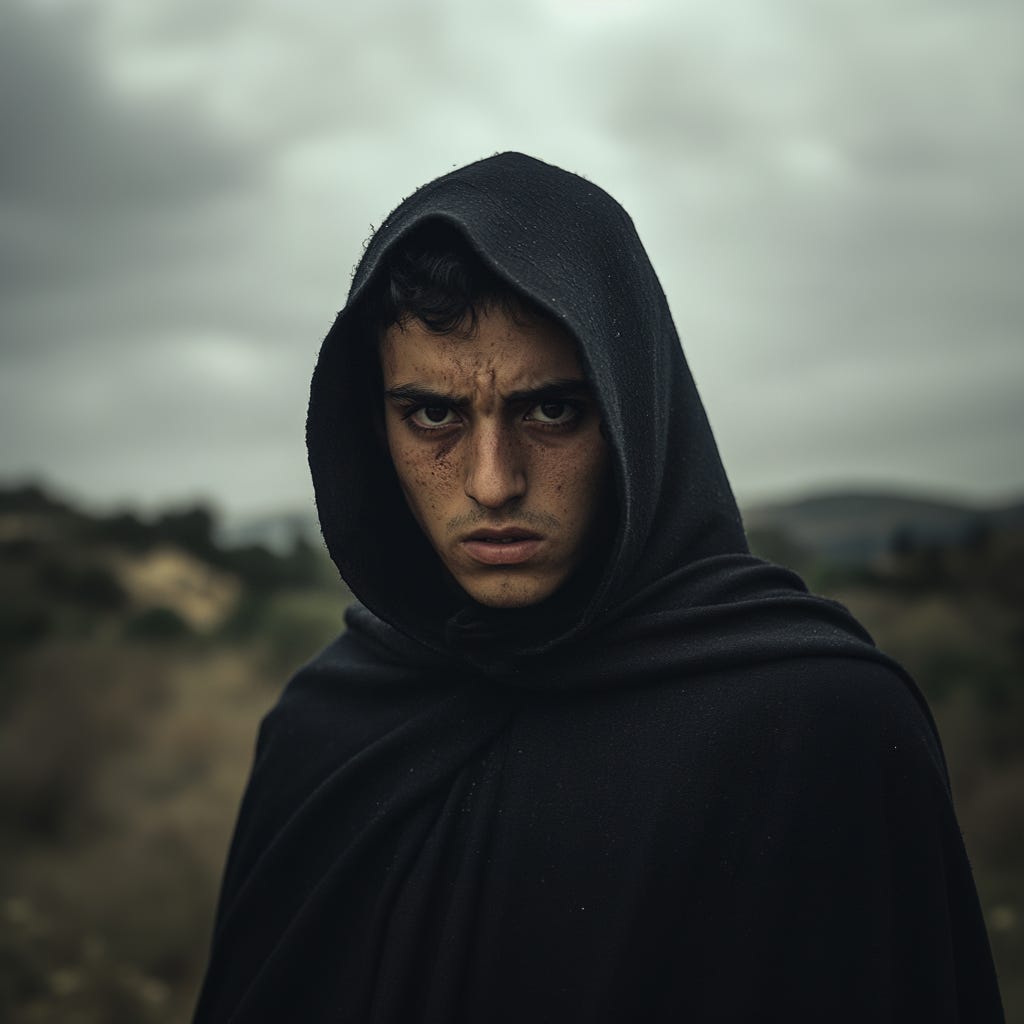
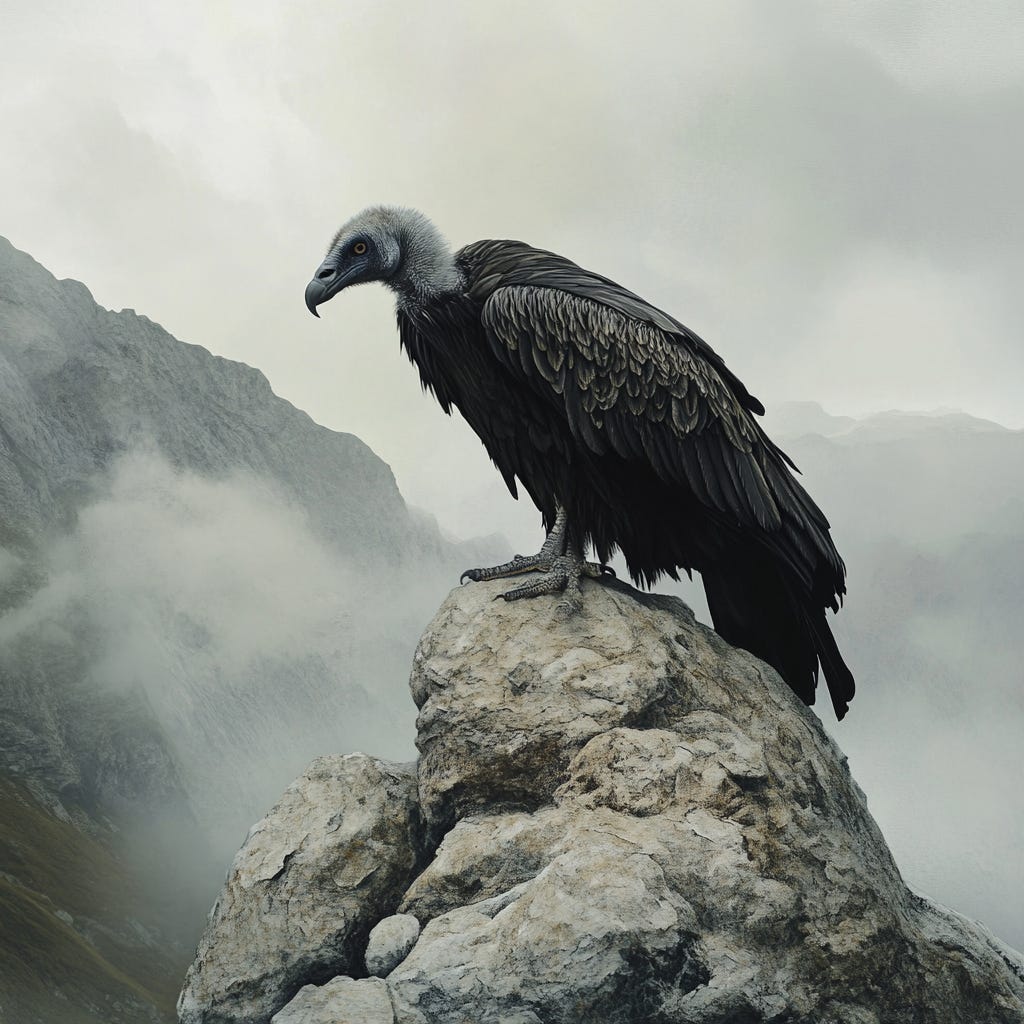
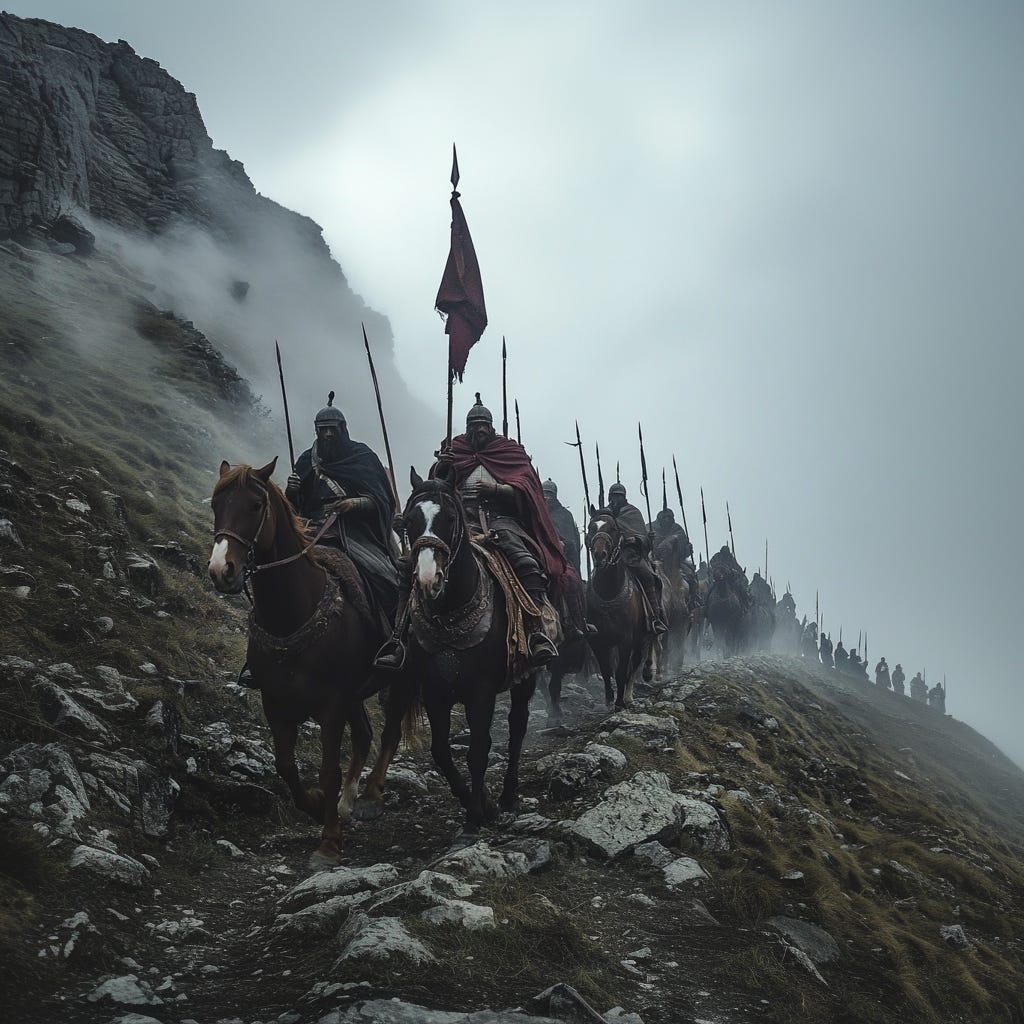
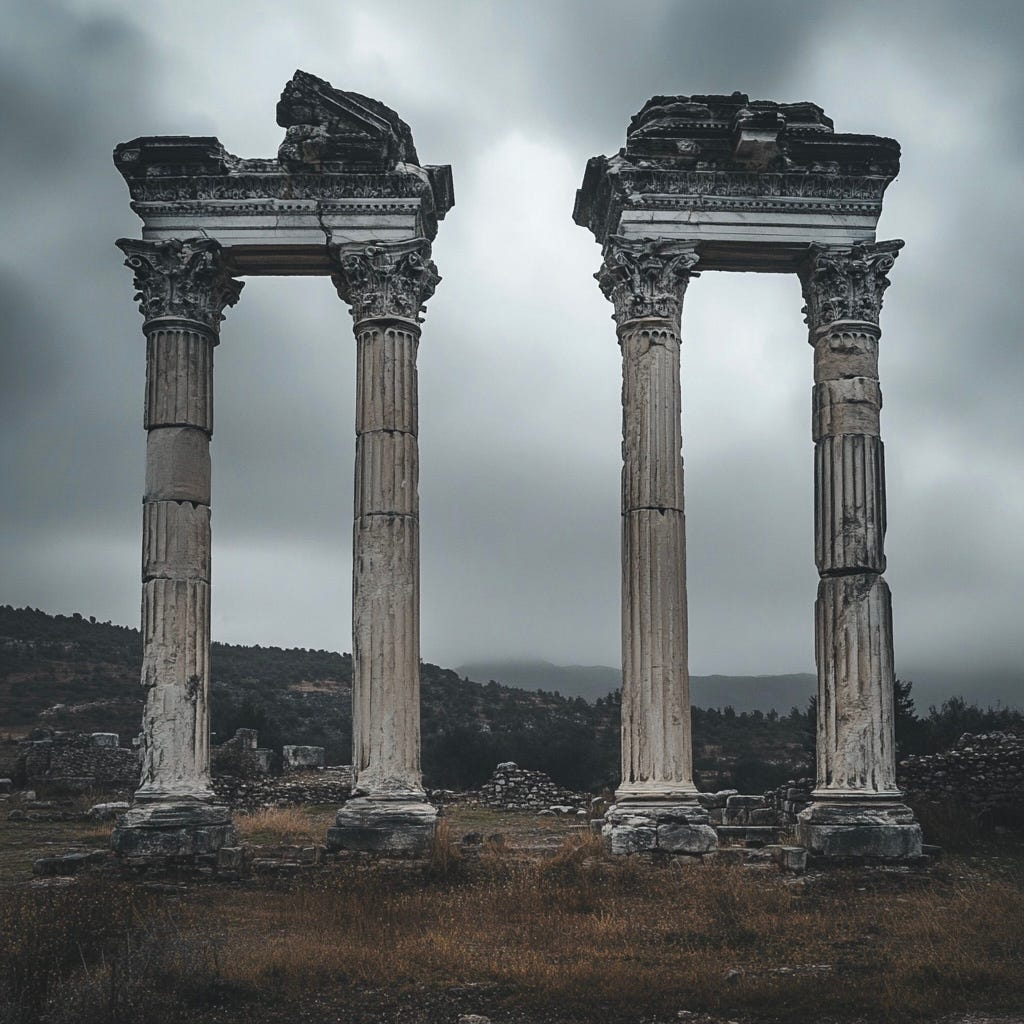
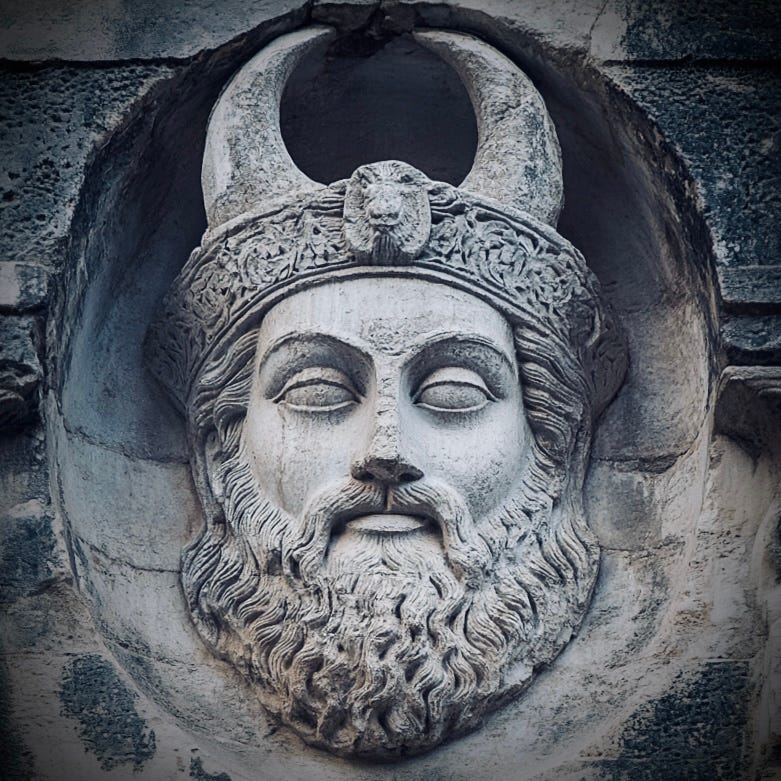
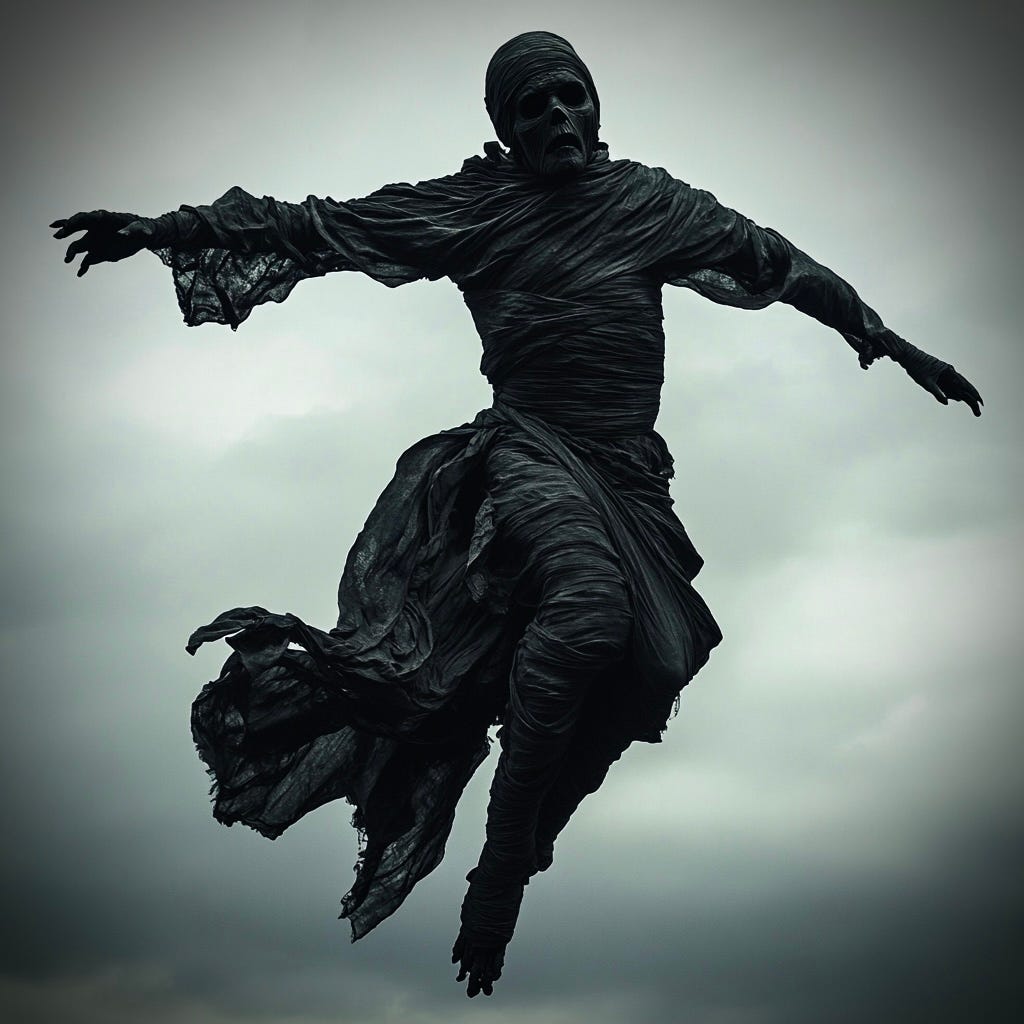
Fascinating historical details here. You shine a (dark) light into the most obscure corners of history :-) Love it!
Excellent as always.